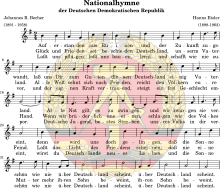Auferstanden aus Ruinen
| English: Risen from the Ruins | |
|---|---|
 | |
National anthem of the German Democratic Republic | |
| Lyrics | Johannes Becher, 1949 |
| Music | Hanns Eisler, 1949 |
| Adopted | November 14, 1949 |
| Relinquished | 3 October 1990 |
"Auferstanden aus Ruinen" (German pronunciation: [ˈaʊfɐˌʃtandn̩ ʔaʊs ʁuˈiːnən]; "Risen from Ruins", lit. 'Resurrected out [of] Ruins') was the national anthem of the German Democratic Republic (GDR), often known informally as East Germany, during its existence from 1949 to 1990.
History[edit]
Background[edit]
In 1949, the Soviet occupation zone of Allied-occupied Germany became a socialist state under the name of the "German Democratic Republic" (GDR).[1] For the nascent state's national anthem, the poet Johannes Becher, who later became the East German Minister of Culture, wrote the lyrics. Two musicians, Ottmar Gerster and Hanns Eisler, proposed music to Becher's lyrics, and Eisler's version was selected.[2]
History[edit]
Written in 1949, the East German national anthem reflects the early stages of German separation and the nation literally rising from the ruins after World War II, in which continuing progress towards reunification of the occupation zones was seen by most Germans as appropriate and natural. Consequently, Becher's lyrics develop several connotations of "unity" and combine them with "fatherland" (einig Vaterland), meaning Germany as a whole. However, this concept soon would not conform to an increasingly icy Cold War context, especially after the Berlin Wall had been erected in 1961 by the East German government.[3]
In September 1973, East and West Germany were admitted to the United Nations simultaneously, following talks between the two governments that conferred a degree of mutual recognition.[4] The term Germany was later removed from the East German constitution, and only the national anthem's tune was played on official occasions.[5] No new lyrics were ever written to replace Becher's, which continued to be used unofficially, especially after die Wende in late 1989: once it became clear that the countries were actually moving towards reunification, East German television Deutscher Fernsehfunk reinstated the work and signed off every night with a joyous symphonic rendition of the vocal arrangement, with accompanying picturesque footage of East Germany's main tourist attractions.[6]
"Auferstanden aus Ruinen" ceased to be a national anthem when the German Democratic Republic dissolved and its states joined the Federal Republic of Germany as a result of German reunification in 1990. "Deutschlandlied", composed in 1841, became the national anthem of a united Germany again. East German Premier Lothar de Maizière had proposed that Becher's lyrics be added to the united German national anthem, but this was rejected by his West German counterpart, chancellor Helmut Kohl.[7]
At the end of its last broadcast on 2 October 1990, the East German international radio broadcaster Radio Berlin International signed off with a vocal version of the East German national anthem.[8]
In November 1995, "Auferstanden aus Ruinen" was played again when German President Roman Herzog visited Brazil. This was the first event at which the anthem had been played since the German reunification.[9]
Lyrics[edit]
| German original | IPA transcription[a] | Literal English translation | Poetic English translation |
|---|---|---|---|
I |
1 |
I |
I |
See also[edit]
Notes[edit]
- ^ See Help:IPA/German and German phonology.
References[edit]
- ^ A Guide to the United States' History of Recognition, Diplomatic, and Consular Relations, by Country, since 1776: East Germany (German Democratic Republic). Office of the Historian. Retrieved 28 January 2024.
- ^ "National Anthem of the German Democratic Republic: "Auferstanden aus Ruinen"(1949)". German History Intersections. Retrieved 28 January 2024.
- ^ "East Germany (GDR) – Auferstanden aus Ruinen". NationalAnthems.me. Archived from the original on 24 June 2017. Retrieved 2 November 2011.
- ^ "S/RES/335(1973)" (PDF). United Nations. Retrieved 28 January 2024.
- ^ Hymne der DDR at LeMO Archived 5 July 2009 at the Wayback Machine
- ^ DDR Fernsehen DFF Aktuelle Kamera Sendeschluss Programmvorschau Nationalhymne der DDR on YouTube, Deutscher Fernsehfunk
- ^ "Neuer Vorschlag: "Auferstanden aus Ruinen" in Nationalhymne?". Rheinische Post. 21 August 2010. Archived from the original on 27 April 2019. Retrieved 3 February 2021.
- ^ RBI, last broadcast, 2 October 1990 on YouTube, Radio Berlin International
- ^ Auferstanden aus Ruinen… Die Nationalhymne der DDR 1949 bis 1990. Berlin: Dietz. 1997. p. 140.
External links[edit]
 Media related to Auferstanden aus Ruinen at Wikimedia Commons
Media related to Auferstanden aus Ruinen at Wikimedia Commons- "Auferstanden aus Ruinen", MP3 at sovmusic.ru
- Text and melody (MIDI) and sheetmusic at ingeb.org
